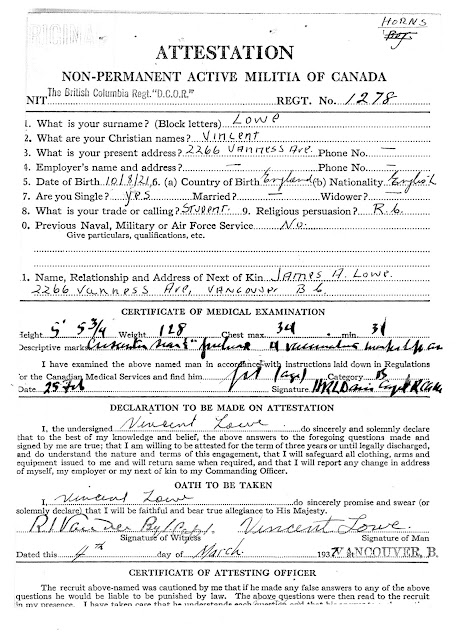As part of my genealogy research, I wanted to know as much about their service as possible. I was lucky in that I inherited my father's papers, which included his original navy service record. This provided me with his attestation document and a list of the ships he served on along with dates, ranks and awards. I also had a variety of other memorabilia for his time in the navy, which can be found online in several places, including the following.
My military post for him:
http://loweancestry.blogspot.ca/2016/04/military-james-edward-lowe.html
And at For Posterity's Sake, a website dedicated to those who served in the RCN and the ships they served on.
http://www.forposterityssake.ca/GALLERIES/PERS-LOWE_JAMES-001.htm
But I suspected there might be more information available from his official military records. I also wanted to find out more about my father's younger brother, Vincent Lowe, and his service in the army during the Second World War.
Belonging to a genealogical society was very helpful in this pursuit of information as I was able to speak with several researchers who had already acquired relatives' service records and could walk me through the process.
First, I learned that the records for service men and women from World War II (and earlier) are kept by Library and Archive Canada. Next I discovered that acquiring these are now free. There was a time when the person requesting information was charged copying fees, which could actually run into the hundreds of dollars if there were many pages from a long military career. But things have changed and now, a 'genealogy package' of essential document is free. I was warned, however, that it could take three to four months to get the package depending on the number of requests in front of mine.
Library and Archives Canada has a comprehensive site for service records with full instructions on how to acquire them.
http://www.bac-lac.gc.ca/eng/discover/military-heritage/pages/obtain-copies-military-service-files.aspx
To get the records, you don't need to provide proof of relationship if the individual has been dead for more than 20 years. You must, however, provide proof of death. But this need not be a formal death certificate; a copy of an obituary will work just as well.
If the person is alive or has been dead for fewer than 20 years, you must provide either written permission from the individual or prove a close relationship (spouse, child, parent, sibling for example), which means along with proof of death you must include copies of birth certificates for the person, you and possible your parents if the records are for a sibling.
When I began inquiring about acquiring the records, it was just under the 20-year mark for my father's death so I waited the few months to make it easier. Since my grandfather and uncle had died earlier, they were already within the range, but I decided to wait and apply for all at the same time. As it turns out, this was a mistake. By the time I applied, there was a backlog due to the number of requests coming in. When I received confirmation of my applications several weeks later, the letter advised the time it would take was five months. I could have applied for my grandfather's and uncle's records when it was still four months.
But six months came and went with no documentation arriving, so I sent an email inquiry. About a week later, I received an email reply advising that due to a lack of staff at LAC, the wait was closer to eight or even nine months.
In fact, it was about seven and half months when the packages finally arriving in my mail box. If I ordered my uncle's and grandfather's records earlier, I'd have had the opportunity to work on those while I waited for my father's.
But they did eventually arrive.
For my father, the package consisted mostly of copies of original documents I already had.
For my grandfather, there was more than I'd expected since he'd only served for six months. The attestation and discharge documents and letters provided information about his life right before and after his service as well as some of his military history from World War I.
But for my uncle, the package was a revelation. The little I thought I knew about his service proved to be at least partially wrong. The documents provided me not only with an accurate account of his service but were a launching off point to research his regiment through war diaries (see the next post Journey # 32 for more details on that).






No comments:
Post a Comment
To prevent spam, your comment must be approved before it appears. Thank-you for your patience.